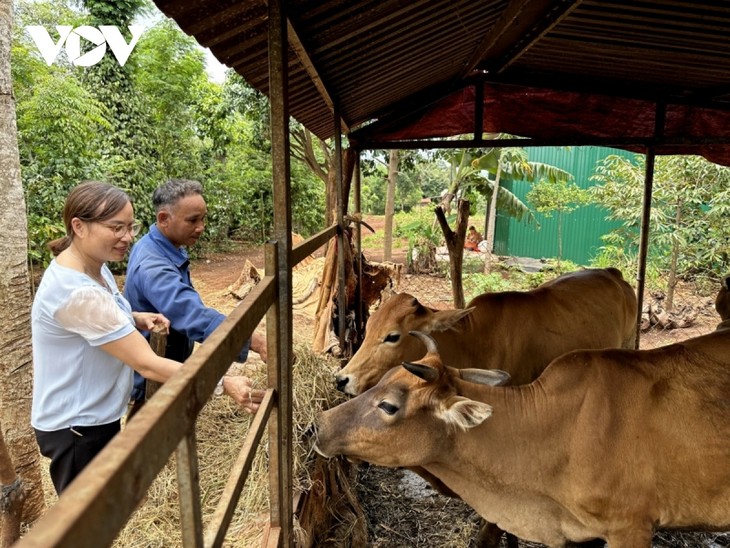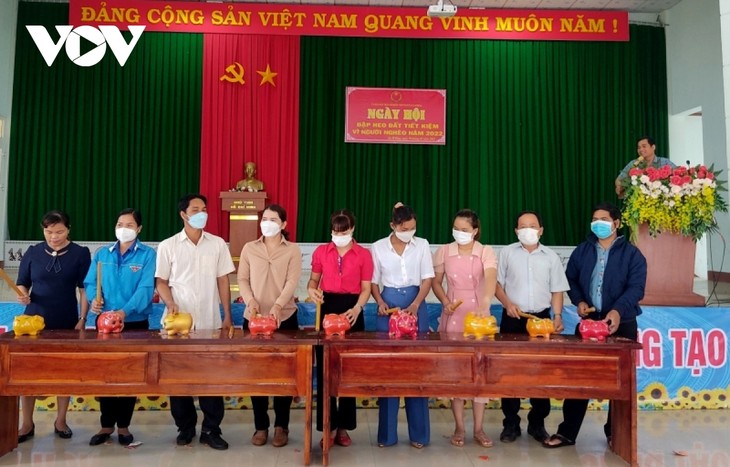(VOVWORLD) - Ea Drong commune in Cu M’gar district, Dak Lak province, is home to more than 3,000 households of 14,000 people, 72% of them indigenous ethnic minorities. They used to depend mainly on agricultural production, and faced many difficulties. But since 2017 Ea Drong residents have escaped poverty thanks to the seedlings and breeding stock provided by the "Piggy bank" model which is being spread across Cu M'gar district.
 Y Hen Nie’s family has escaped poverty by raising cows provided by Ea Drong commune’s Fatherland Front. Y Hen Nie’s family has escaped poverty by raising cows provided by Ea Drong commune’s Fatherland Front. |
Y Hen Nie in Yong B hamlet didn’t have a stable job. All subsistence expenses and the money needed to raise his three children came from his wages.
In 2017 his family was financed by the district administration to build a house and, one year later, given 255 USD by Ea Drong commune’s Fatherland Front from the “Piggy bank” fund to buy a cow.
After 6 years, Y Hen Nie’s family has developed a herd of 5 cows. Last year they were removed from the list of poor households and are enjoying a better life, said Y Hen Nie.
“Thanks to State support, the provision of breeding stock from the piggy bank model, and construction of the house, all my family members have become more motivated. We do side jobs to create a better life,” he said.
Like Y Hen Nie, H Blip Nie in Yong hamlet worked as a hired hand to make ends meet and pay for her children’s schooling.
At the end of 2017, Ea Drong commune’s Fatherland Front gave her 255 USD from the “Piggy bank” fund to buy 3 female goats. Now her family has a herd of 9 goats.
H Blip Nie told VOV, “My family used to be very poor. Since being helped by the state to breed goats, our life is less difficult. Raising goats gave us enough money that, with a loan, we were able to buy some land to grow coffee. Gradually we have expanded our production and escaped poverty.”
Y Hen Nie and H Blip Nie are two of dozens of poor people in Ea Drong commune who have been financially supported to buy breeding stock for production development. Under the "Piggy bank" model launched in 2017, state officials, Party members, and others have been encouraged to save at least 1,000 VND per month.
The fund is reviewed every year on November 18 in the form of a festival to break open the savings-filled piggy banks. The collected money is allocated to social organizations to purchase seedlings and breeding stock for poor households. Social organizations and associations take responsibility for monitoring and managing the model.
 The festival to break open piggy banks is held annually In Ea Drong commune. (Photo: VOV) The festival to break open piggy banks is held annually In Ea Drong commune. (Photo: VOV) |
Ea Drong commune has mobilized more than 950 piggy banks, raising 18,800 USD, which has been used to help 44 poor and near-poor households to implement livestock and farming models. Eight households have escaped poverty.
The piggy bank model has become a widespread movement throughout Cu Mgar district, creating resources to support households in difficult circumstances.
The percentage of poor households in Cu Mgar has decreased to 4.4% and near-poor households to 7.5%, while the per-capita income has reached 2,500 USD a year.
Y Wem Hwing, Deputy Chairman of Cư Mgar district People’s Committee, said, “We consider the care of poor households, policy families, and those in difficult circumstances to be a top mission in line with the Party’s principle that no one be left behind. The district has disseminated Party guidelines and State laws and policies to give people the right perception and right action to become useful citizens.”
The “Piggy bank” model has stabilized the lives of many families in Cu Mgar district, especially ethnic minority families, giving them greater confidence in the Party and State and boosting the local economy.